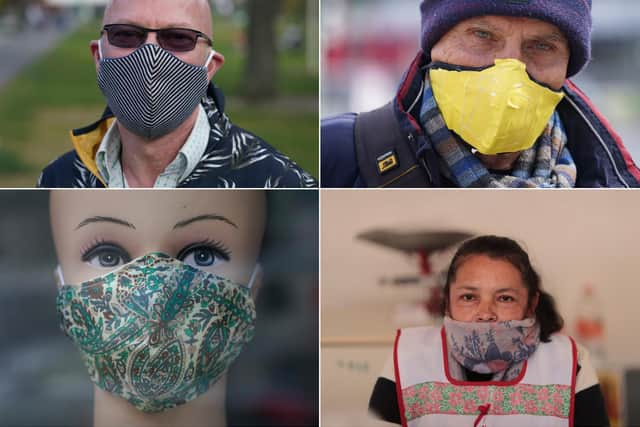Call for home-made face masks for the public
and live on Freeview channel 276
The campaign group Masks4All has suggested that home-made masks can slow the spread of Covid-19
But the World Health Organisation (WHO) has said that there is no evidence to support the use of masks in the general population.
Advertisement
Hide AdAdvertisement
Hide AdIn the wider community outside of health and care facilities, people should wear masks if they are sick or caring for those who are ill, the WHO said.


The Masks4All campaign group was started in the Czech Republic, but now has a global following.
More than 100 UK medics have lent support to the campaign.
Dr Helen Davison told The Daily Telegraph that the group was "advocating the use of cloth masks as a precautionary principle" and that it had been inspired by action taken in other countries "that have introduced face masks at population level".
Scientific advisers for the Government are carrying out a review on face masks.
Advertisement
Hide AdAdvertisement
Hide AdThe Masks4All group website states: "The WHO only recommends masks for those infected with Covid-19 or those taking care of people infected with Covid-19. But ~50% of people who have Covid-19 are asymptomatic.
"So it follows basic logic that if we don't know who has it and anyone who has it needs to wear a mask, then we should all wear masks."
But WHO guidance issued earlier this month acknowledges that the virus could be passed on by people who are not yet symptomatic, but it states: "Current evidence suggests that most disease is transmitted by symptomatic laboratory confirmed cases."
It adds: "There is currently no evidence that wearing a mask (whether medical or other types) by healthy persons in the wider community setting, including universal community masking, can prevent them from infection with respiratory viruses."
Advertisement
Hide AdAdvertisement
Hide AdIt warned that the use of masks by the public can create a "false sense of security" and lead to people ignoring other protective measures, such as hand hygiene and physical distancing.
Masks can even be a source of infection when not used correctly, the WHO added.
Prof Babak Javid, consultant in infectious diseases at Cambridge University Hospitals, told the PA news agency that he believes that "population mask wearing should be an important part of the response to Covid", he added: "Once Covid cases are largely suppressed, we can stop wearing masks, their incremental gain will be low. But now, to really benefit from masks, the majority of us need to wear masks."
Professor Jackie Cassell, deputy dean at Brighton and Sussex Medical School, added: "It's a balance - masks can protect, but they can also carry virus from one person to another. Putting a mask on and off involves touching your face.
Advertisement
Hide AdAdvertisement
Hide Ad"If you put a clean mask on your face before leaving home that may reduce your risk of breathing in virus particles on public transport, for example. Also, if you have Covid today but no symptoms, and you cough, you will be less likely to transmit it to someone else.
"On the other hand if you are wearing a mask, and adjust it while shopping, you may transfer virus onto the mask and your face from what you have touched. In this case the mask can act as a 'fomite' which transfers virus from one person to another.
"You need to be very careful taking your mask off, and disposing of it or putting it in the washing machine. It's still essential to wash your hands before going out, when you get to work or back home. Make sure you don't touch a used mask after washing your hands."